La dimensione del font ha un ruolo importante nel rendere il contenuto del sito web cancellato, leggibile e visivamente attraente.
Che si tratti di un blog, di un negozio di e-commerce o di un sito aziendale, sapere come regolare le dimensioni del font in WordPress consente di personalizzare il design in corrispondenza del proprio brand e di migliorare l’esperienza dell’utente.
Noi di WPBeginner scriviamo articoli su WordPress da oltre dieci anni. In questo periodo, abbiamo sempre dato la priorità a rendere i nostri contenuti leggibili e accessibili al nostro pubblico. Ciò include la scelta di una dimensione del font che sia facile da leggere, pur mantenendo un aspetto pulito e visivamente attraente.
In questo articolo vi mostreremo come modificare facilmente la dimensione dei caratteri nei post e nei temi di WordPress.
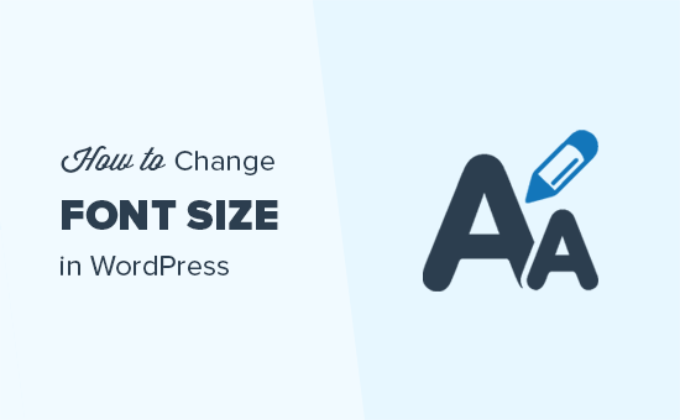
Perché cambiare la dimensione dei caratteri in WordPress?
Modificando la dimensione dei caratteri sul vostro sito WordPress, potete migliorare la leggibilità dei contenuti e facilitare la lettura da parte degli utenti.
Inoltre, l’aumento della dimensione del font può aiutarvi a mettere in evidenza le informazioni importanti sul vostro blog WordPress.
Ad esempio, se sul vostro sito presentate un prodotto affiliato, l’aumento della dimensione dei caratteri può contribuire a rendere il prodotto più evidente. Inoltre, può rendere il contenuto più leggibile per gli spettatori che accedono al vostro sito web tramite dispositivi mobili.
Detto questo, vediamo come cambiare facilmente la dimensione dei caratteri in WordPress.
In questa esercitazione verranno trattati diversi metodi, quindi potete usare i link sottostanti per passare al metodo che preferite:
- Method 1: How to Change the Font Size Using Headings
- Method 2: Change the Font Size of Text in the Block Editor
- Method 3: Change Font Size Using a Plugin
- Method 4: Change Site-Wide Font Size Using Full Site Editor
- Method 5: Change Site-Wide Font Size Using WPCode
- Bonus: Change Text Color in WordPress
- Video Tutorial
Metodo 1: come modificare la dimensione del font utilizzando le intestazioni
Se state cercando un modo semplice per modificare la dimensione dei caratteri utilizzando le intestazioni, questo metodo fa al caso vostro.
L’uso di titoli nei contenuti è un ottimo modo per catturare l’attenzione dell’utente con un carattere di dimensioni maggiori.
Nella maggior parte dei temi WordPress, i titoli hanno un carattere più grande rispetto al testo normale, consentendo di suddividere i post e le pagine in sezioni.
I titoli sono anche ottimi per migliorare la SEO del sito, in quanto i motori di ricerca attribuiscono ai titoli corretti un peso maggiore rispetto al normale testo dei paragrafi.
Come aggiungere un titolo nell’editor di blocchi predefinito di WordPress
Per prima cosa, è necessario aprire un nuovo post o una nuova pagina nell’editor di blocchi di WordPress.
Una volta arrivati a questo punto, fare clic sul pulsante “Aggiungi blocco” (+) nell’angolo superiore sinistro dello schermo per aprire il menu dei blocchi.
Da qui, si deve trovare e aggiungere il blocco Heading alla pagina/post.
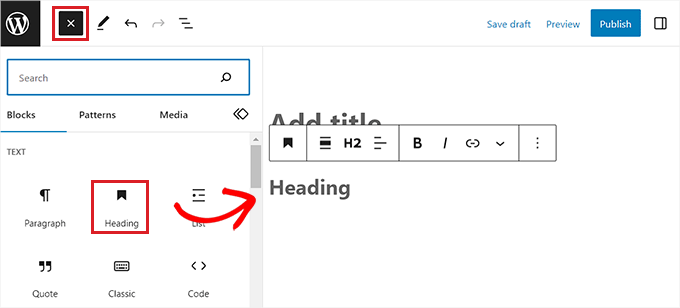
Per impostazione predefinita, il blocco sarà impostato sull’intestazione 2.
Se si sta aggiungendo un sottotitolo, è opportuno attenersi all’opzione “Titolo 2”.
Tuttavia, se si desidera modificare questa impostazione, è sufficiente fare clic sul menu a discesa ‘H2’ per selezionare una dimensione diversa.
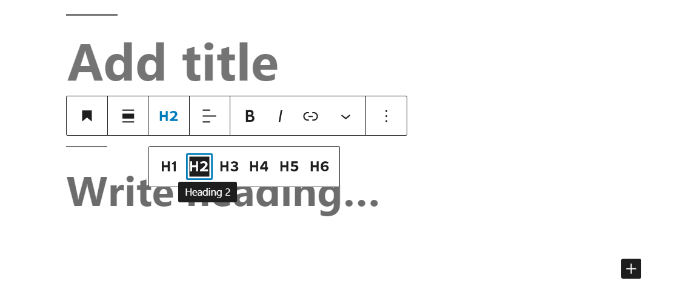
In alternativa, è possibile modificare le dimensioni dell’head utilizzando le impostazioni del blocco sulla barra degli strumenti a destra della schermata.
È anche possibile personalizzare il colore, l’aspetto, le lettere maiuscole e minuscole dell’intestazione.
Una volta terminato, non dimenticate di fare clic sul pulsante “Aggiorna” o “Pubblica” per memorizzare le impostazioni.
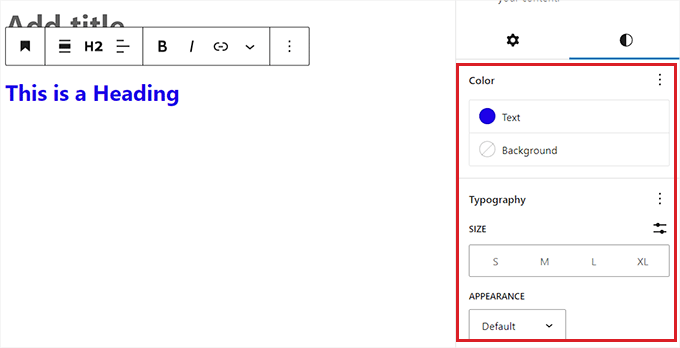
Come aggiungere un’intestazione nel vecchio editor classico
Se si utilizza ancora il vecchio editor classico di WordPress, è possibile aggiungere titoli utilizzando il menu a discesa Paragrafo.
Per prima cosa, selezionare con il mouse il testo che si desidera trasformare in titolo.
Quindi, fare clic sul menu a discesa “Paragrafo” nell’angolo in alto a sinistra e selezionare la dimensione dell’intestazione. A questo punto si è riusciti a modificare la dimensione del carattere di un titolo.
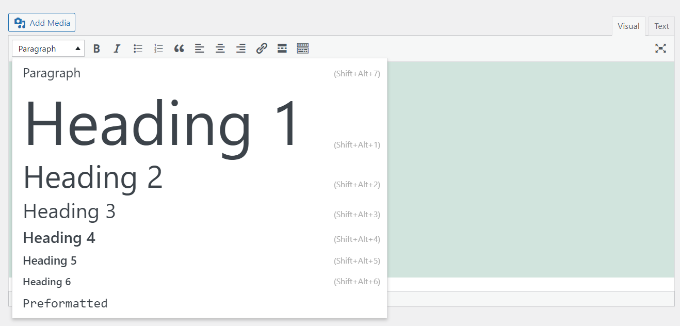
Tuttavia, si tenga presente che l’editor classico non consente di modificare le dimensioni e i colori dei caratteri dei diversi stili di intestazione.
Se si desidera farlo, è necessario apportare modifiche al foglio di stile del tema (style.css).
Infine, basta fare clic sul pulsante “Aggiorna” o “Pubblica” per salvare le modifiche.
Metodo 2: modificare la dimensione dei caratteri del testo nell’Editor blocchi
Se si desidera modificare la dimensione del font predefinito del testo nel blocco Paragrafo, questo metodo fa al caso vostro.
Per prima cosa, è necessario aprire una pagina/post esistente nell’editor di Gutenberg.
Una volta lì, fate clic su qualsiasi blocco Paragrafo e poi passate alla scheda “Stili” dal pannello dei blocchi sul lato destro dello schermo.
Da qui è necessario scegliere la dimensione del carattere dalla sezione “Tipografia”.

È possibile selezionare l’opzione Small, Medium, Large o Extra Large in base alle proprie esigenze.
Se si desidera ripristinare le dimensioni originali del testo, è possibile farlo facendo clic sul menu con tre puntini accanto alle impostazioni di Tipografia.
Si aprirà un nuovo menu a tendina in cui si dovrà fare clic sull’opzione “Ripristina”.
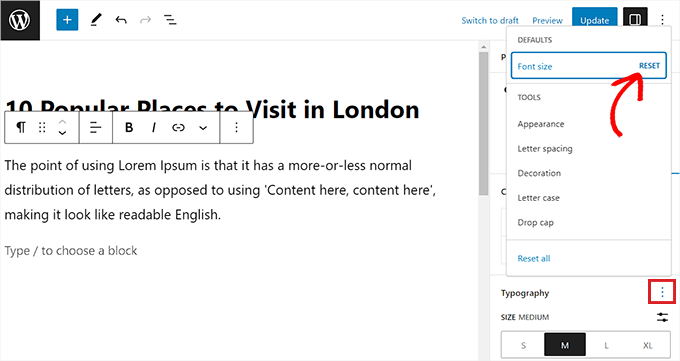
Inoltre, con lo stesso menu a tendina, è possibile aggiungere le maiuscole, le lettere, l’interlinea, l’aspetto e molto altro ancora.
A questo punto, basta fare clic sul pulsante “Aggiorna” o “Pubblica” per memorizzare le modifiche.
Tenete presente che queste opzioni non sono disponibili nel vecchio Classic Editor di WordPress. Se volete utilizzarle, prendete in considerazione il passaggio.
Metodo 3: Cambiare le dimensioni dei caratteri con un plugin
Se si desidera modificare la dimensione dei caratteri utilizzando un plugin, è possibile utilizzare questo metodo.
Per prima cosa, è necessario installare e attivare il plugin Advanced Editor Tools. Per istruzioni dettagliate, consultate la nostra guida per principianti su come installare un plugin di WordPress.
Una volta attivato, il plugin offre un maggiore controllo sulle dimensioni dei caratteri e sulla formattazione del testo, oltre a una serie di altre caratteristiche. Aggiunge un nuovo blocco “Paragrafo classico” che presenta tutte le caratteristiche di formattazione di vostra scelta.
Dopo l’attivazione, accedere alla pagina Impostazioni ” Strumenti dell’editor avanzato dalla barra laterale dell’amministrazione di WordPress.
A questo punto, è possibile trascinare facilmente le funzioni di formattazione dalla sezione “Pulsanti inutilizzati” al blocco “Paragrafo classico”.
Queste caratteristiche includono dimensione dei caratteri, famiglia di caratteri, copia, pedice, emoticon, codice sorgente e altro ancora.
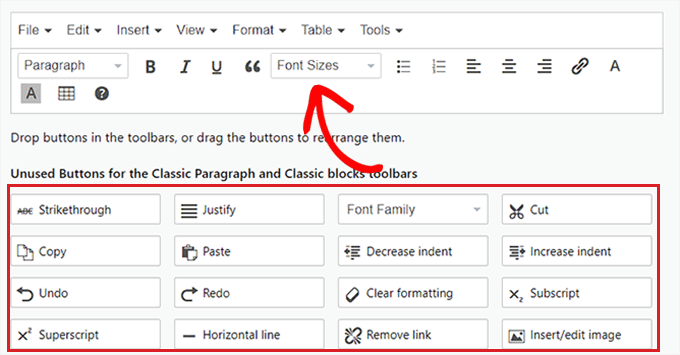
Una volta fatto ciò, scorrere fino alla sezione “Opzioni” e selezionare l’opzione “Dimensioni dei caratteri” per accedere a un numero maggiore di dimensioni dei caratteri.
A questo punto, è sufficiente fare clic sul pulsante “Salva modifiche” per memorizzare le impostazioni.
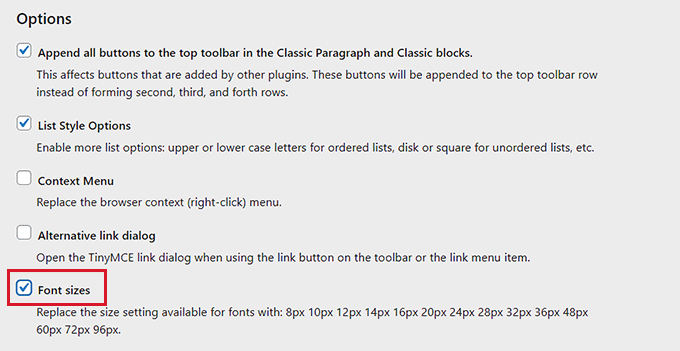
Se si utilizza il plugin con l’editor classico, è necessario passare alla scheda “Editor classico” dall’inizio della pagina.
Una volta arrivati a questo punto, è necessario eseguire le stesse azioni dell’editor di blocchi.
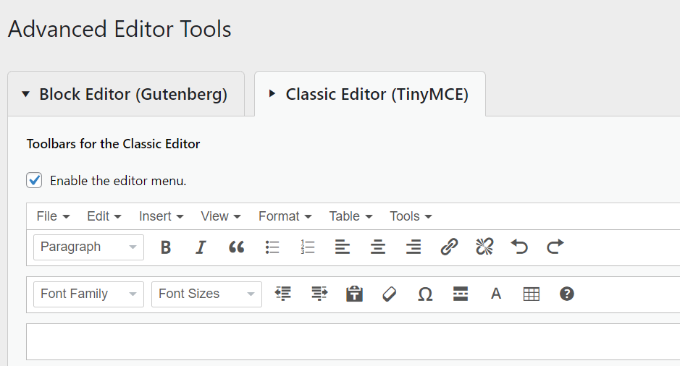
Assicurarsi di fare clic sul pulsante “Salva modifiche” dopo aver apportato le modifiche.
Ora, per vedere il plugin in azione, è necessario aprire una pagina o un post nuovo o esistente dalla dashboard di WordPress.
Una volta arrivati a questo punto, fare clic sul pulsante “Aggiungi blocco” (+) nell’angolo superiore sinistro dello schermo per aprire il menu dei blocchi.
Da qui, trovare e aggiungere il blocco Paragrafo classico alla pagina.
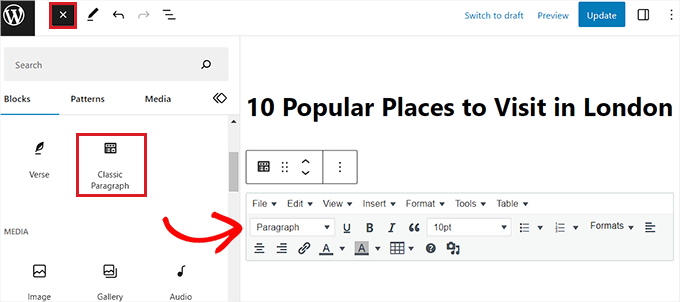
È ora possibile utilizzare il menu a discesa “Dimensioni carattere” per modificare le dimensioni del testo nel blocco “Paragrafo classico”.
Infine, fare clic su “Aggiorna” o “Pubblica” per salvare le impostazioni del post o della pagina.
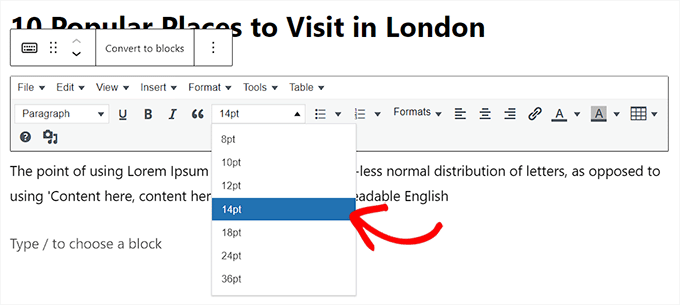
Metodo 4: Modificare la dimensione del font a livello di sito utilizzando l’editor del sito completo
Se utilizzate un tema a blocchi, questo metodo fa al caso vostro. La maggior parte dei temi a blocchi è dotata di una caratteristica integrata di stili globali, che consente di controllare le dimensioni della tipografia in tutto il sito web senza alcuna codifica.
A tale scopo, visitate la pagina Aspetto ” Editor dalla dashboard di WordPress e fate clic sull’icona “Stili” in alto a destra. Si aprirà un nuovo pannello, dove dovrete selezionare l’opzione “Tipografia”.
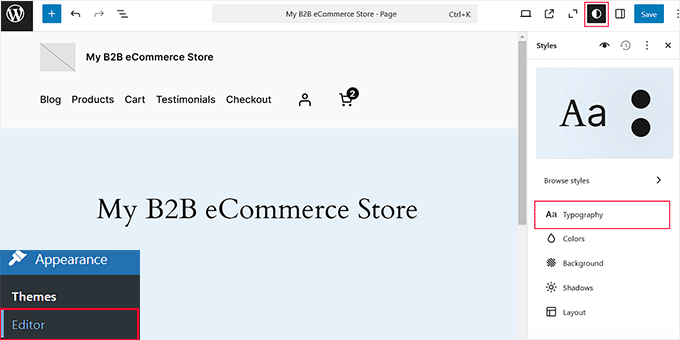
Una volta visualizzate le nuove impostazioni nella barra laterale, è possibile modificare facilmente il tipo di font per l’intero sito dalla sezione “Font”.
Quindi, scorrere giù fino alla sezione “Elementi” e scegliere la scheda “Testo”.
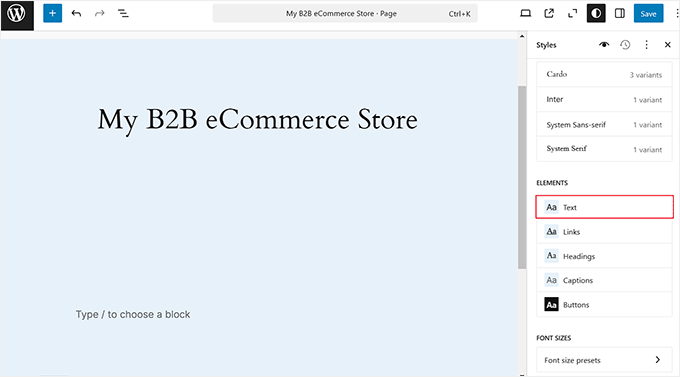
Ora è possibile modificare la dimensione del font, il tipo e la spaziatura per tutto il testo del sito web.
Una volta terminato, si può tornare alla sezione “Elementi” per modificare la dimensione del font per tutte le head, i link, le didascalie e i pulsanti.
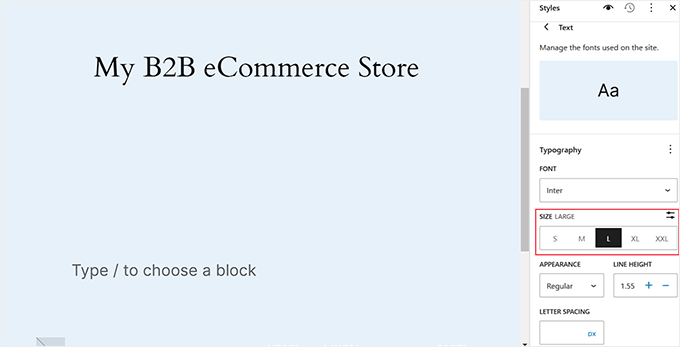
Se non siete ancora soddisfatti, potete cambiare completamente le dimensioni del font preimpostate per il vostro sito.
Queste preimpostazioni definiscono dimensioni standard per diverse opzioni di testo, come piccolo, medio e grande. Ad esempio, quando si sceglie “small” come dimensione del font in qualsiasi punto del sito web, questa viene automaticamente impostata a 0,9 rem.
Tuttavia, è possibile personalizzare la preimpostazione in modo che “piccolo” significhi invece 1 rem. In questo modo è possibile regolare le dimensioni del font in base alle proprie preferenze.
A tale scopo, è sufficiente fare clic sull’opzione “Preimpostazione della dimensione del font” in basso.
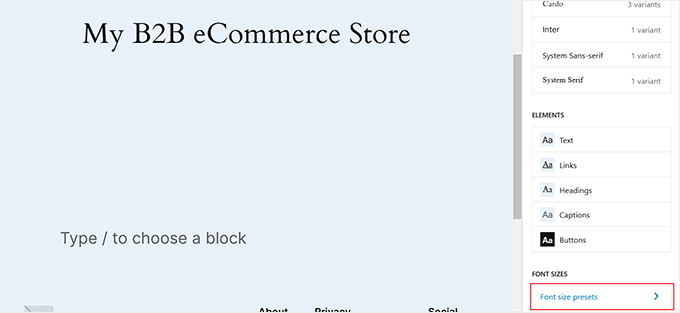
Una volta aperta la nuova schermata, è possibile modificare facilmente le preimpostazioni per le dimensioni del font in tutto il sito.
Infine, fare clic sul pulsante “Salva” per salvare le impostazioni. A questo punto è stato possibile modificare la dimensione del font a livello di sito utilizzando l’editor completo del sito.
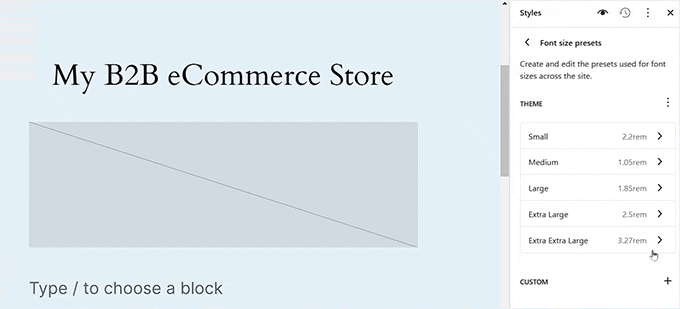
Metodo 5: modificare la dimensione del font a livello di sito utilizzando WPCode
Questo metodo è adatto se si desidera modificare la dimensione del font in tutto il sito web, ma non si utilizza un tema a blocchi.
È possibile aggiungere facilmente questa funzionalità inserendo il codice CSS nel sito web utilizzando WPCode.
È il miglior plugin di snippet di codice per WordPress sul mercato che rende super facile e sicuro aggiungere codice al vostro sito web.
Per prima cosa, è necessario installare e attivare il plugin WPCode. Per istruzioni dettagliate, consultare la nostra guida passo passo su come installare un plugin di WordPress.
Nota: WPCode ha un piano gratuito che si può utilizzare per il tutorial. Tuttavia, l’aggiornamento alla versione pro vi darà accesso a ulteriori caratteristiche, come la logica condizionale, una libreria cloud di frammenti di codice e altro ancora.
Dopo l’attivazione, andate alla pagina Code Snippets ” + Add Snippet dalla barra laterale dell’amministrazione di WordPress.
A questo punto, fare clic sul pulsante “+ Aggiungi snippet personalizzato” sotto l’opzione “Aggiungi il tuo codice personalizzato (nuovo snippet)”.
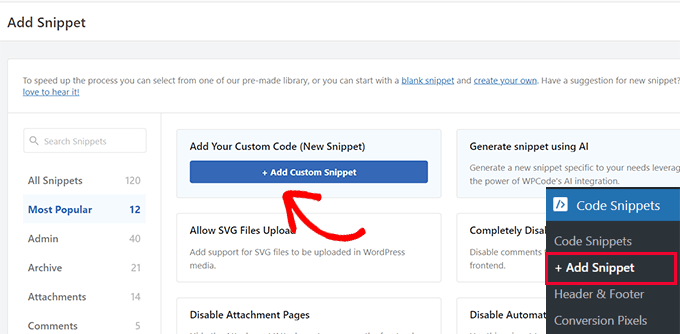
Successivamente, è necessario selezionare “CSS Snippet” come tipo di codice dall’elenco di opzioni che appare sulla schermata.
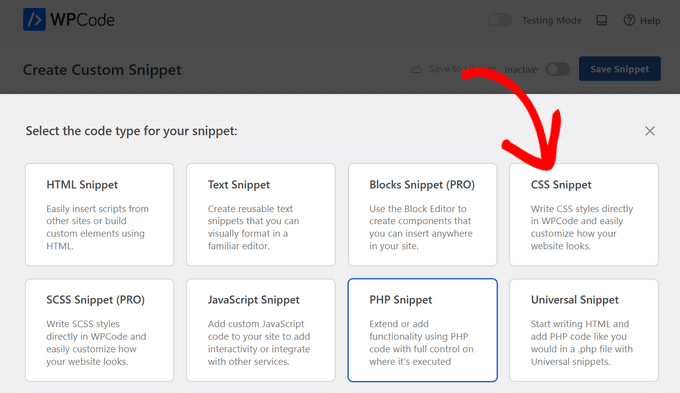
Si accede così alla pagina “Crea snippet personalizzato”, dove si può iniziare a dare un titolo al proprio snippet di codice.
Ad esempio, abbiamo usato il titolo “Modifica della dimensione del font del sito”.
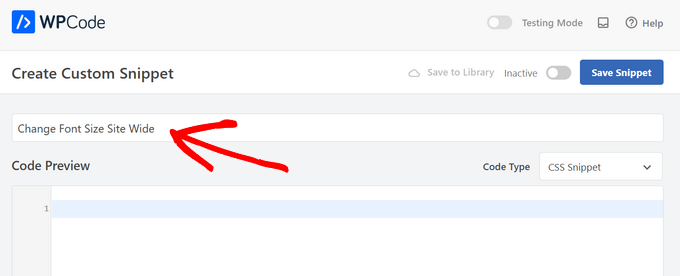
Quindi, copiare e incollare il seguente codice CSS personalizzato nella casella “Anteprima codice”:
1 2 3 | p {font-size:16px;} |
Una volta fatto ciò, è sufficiente aggiungere la dimensione del testo desiderata accanto alla riga “font-size” nel codice CSS.
L’aspetto dovrebbe essere il seguente.
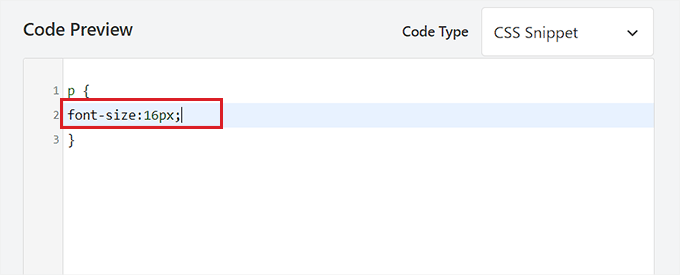
Quindi, scorrere fino alla sezione ‘Inserimento’ e scegliere la modalità ‘Inserimento automatico’.
Il codice verrà eseguito automaticamente sul vostro sito al momento dell’attivazione.

Infine, scorrere indietro fino alla parte superiore della pagina e spostare l’interruttore “Inattivo” su “Attivo”.
Quindi, fare clic sul pulsante “Salva snippet” per eseguire il codice.
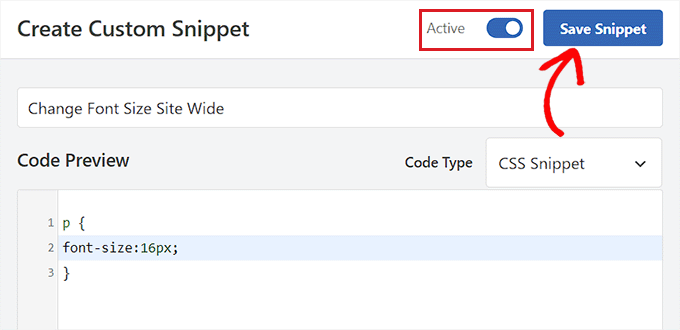
Ora avete modificato con successo la dimensione dei caratteri sul vostro sito WordPress.
Bonus: Cambiare il colore del testo in WordPress
Oltre alle dimensioni, potreste anche cambiare il colore del testo sul vostro sito web per rendere i contenuti più leggibili e visivamente accattivanti. Può anche migliorare il vostro branding e contribuire a mettere in evidenza le informazioni importanti.
Per modificare il colore del testo, è necessario aprire un post del blog nell’editor di blocchi e scegliere un blocco Paragrafo. Una volta fatto ciò, passare alla scheda ‘Stili’ dal pannello dei blocchi e fare clic sull’opzione ‘Testo’.
Si aprirà lo strumento selettore colore, dove è possibile selezionare un colore di testo a scelta per il contenuto.
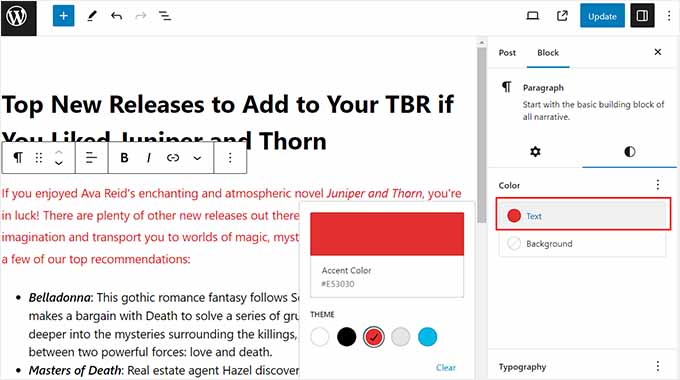
Se volete cambiare i colori del testo in tutto il sito web, potete usare WPCode, che è il miglior plugin per snippet di codice per WordPress sul mercato.
Dopo l’attivazione, è sufficiente visitare la pagina Code Snippets ” + Add Snippet dalla barra laterale dell’amministrazione di WordPress e fare clic su “Use Snippet” sotto l’opzione “Add Your Custom Code”.
Si accede così alla pagina “Crea snippet personalizzato”, dove si deve selezionare “Snippet CSS” come tipo di codice e poi copiare e incollare il seguente codice nella casella “Anteprima codice”:
1 | p { color:#990000; } |
Se si desidera utilizzare un colore diverso per le intestazioni del sito, è necessario utilizzare i selettori h1, h2, h3 o simili.
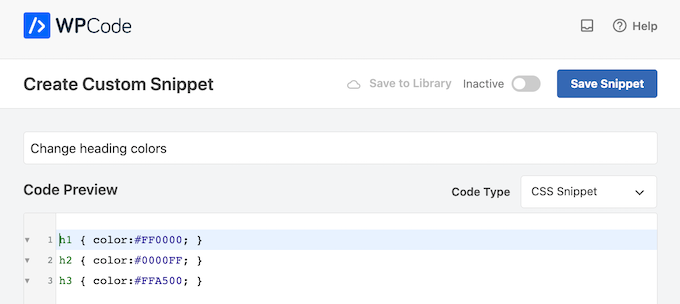
Infine, fare clic sul pulsante “Salva snippet” e spostare l’interruttore “Inattivo” su “Attivo”.
Ora avete cambiato con successo il colore del testo in tutto il vostro sito web. Per istruzioni dettagliate, consultate il nostro tutorial su come cambiare il colore del testo in WordPress.
Video tutorial
Se non vi piacciono le istruzioni scritte, potete invece guardare i nostri video:
Speriamo che questo articolo vi abbia aiutato a capire come cambiare facilmente la dimensione del font in WordPress. Potreste anche voler consultare la nostra guida su come utilizzare i font personalizzati in WordPress o il nostro tutorial su come disabilitare Google Fonts sul vostro sito web WordPress.
Se questo articolo vi è piaciuto, iscrivetevi al nostro canale YouTube per le esercitazioni video su WordPress. Potete trovarci anche su Twitter e Facebook.





Joseph
The TinyMCE really worked! Thanks alot☺
mate wierdl
How about changing font size in comments to blog posts?
Naomi
Thanks for the TinyMCE plugin suggestion for this. Super simple and it works great. I appreciate it!
WPBeginner Support
Hey Naomi,
Glad you found it useful
You may also want to subscribe to our YouTube Channel for WordPress video tutorials.
Admin
Abhisehkd
really helpful. my site is also suffering from low font size . is there is any way to solve this through style.css
Aslam Fawad
Thanks. Nice Post..
Judy
I too, would like to learn how to change font size in the style sheet.
J
Thank GOD I found this article!
Keivon
OMG. You are wonderful. That plugin is so simple and exactly what I needed. Thanks
Henderson
Thanks for this very helpful post
dennis mitchell
Thanks. very helpful.
Brian Woodburn
the point to change size of font etc has gone from the face bar
ifaheem
Thanks for the help!
Jana Sheeder
Thank you very much for a great tutorial. Very soothing voice that’s clear and easy to understand, too. I appreciate you!
Susan
Unfortunately, this is only available to paid accounts. If you’re using WordPress.com, there is no Plugins tab located in the Dashboard.
“On WordPress.com, we include the most popular plugin functionality within our sites automatically. As a result, WordPress.com users won’t find a Plugins tab in the Dashboard.”
Melissa
Actually, it’s only available to WordPress.org accounts, which is not the same as a paid WordPress.com account. Anytime you see “WordPress” without a .com at the end, it’s safe to assume it’s referring to the self-hosted .org, which WPBeginner tips & tutorials are aimed at. I know it can be confusing for people who use .com, but the two really are very different animals. When looking for help, you’ll get better results if you’re sure to include “wordpress.com” in your search terms.
Jo-Anne
I have tried to download TinyMCE several times without success. When I try to open the files. everything appears to be written in Arabic (characters look like that!) Any other suggestions as I’m new to WordPress and would love to get my website up and running. Thank you!
Cinnamonblue
NO Thanks for NOT publishing my comment. I did see in another comment that I cannot use TinyMCE or plug ins on WordPress.org.
I’m still not sure about paragraph headings, though. I have that button, but I didn’t seem to be able to get it to give a dropdown menu or anything.
One main reason I got frustrated with WP was that I couldn’t seem to change font size and the text of my blog always seemed too small.
Anthony
thank you so much.
i am relieved now that i have this plugin
Laura
Thank you so much for the tutorial! I was able to change the font size in my posts…. but I cannot figure out how to change the font for the widgets in my sidebar… any suggestions?
WPBeginner Support
Please see our guide on how to add custom styles to WordPress widgets.
Admin
Grace Joubarne
I sure wish someone could explain how we can change the post title font size without the change affecting the Recent Posts widget. I am using the basic Twelve Thirteen. It offers advanced Post Title font changes with a link found directly under the title. But totally useless, since any changes equally affect the Recent Posts box!
Grace Joubarne
What about changing the font size of the Title….when I try to do this, the Recent Posts in the sidebar increases in size and looks terrible. No way is offered to resolve this anywhere that I can find…and I’ve been looking for hours. But unless I reduce the title size, the default size is so large it takes up half the opening page.
Greg Smith
Are these option, including the plugin font size options not available if you host your own site or something? I did everything everybody says to do, dragging the font size button to the bar etc., and I get no option to resize fonts no matter what.
I also have no “paragraph” menu.
Thanks.
WPBeginner Staff
We have updated the article with new instructions. Hope this resolves the issue. Thanks for notifying us.
Colin
In method 2 described in this article- the font size option does not exist when you install it. It does add options (most of which already exist) but the one that nearly everybody wants is sadly absent. I guess photoshop was used for the above illustration
Pastelaso29
how can I change the font of a specific title page without affecting the title on the rest of the pages?
Casey
I installed the plug-in from the link on this page and installed and activated it. I opened the second menu with the last button on the first row but it looks the same as before I installed it. I tried deactivating and reactivating several times but the option to change the font is still not there. A new row at the top (I think it’s new, anyway) appeared with “file”, “edit”, “insert”, etc. right above what used to be the first row.
richard lee morris
Thanks! This article helped me. I was guided to the “extended” menu — by clicking the last button “Toggle Toolbar.”
Zakia H
Richard!! You just save me from pulling my hair out. I’ve been trying to figure out how to view the extended menu and had no idea I had to click the “Toggle Toolbar” button. Thank you for your comment
Sharon Seltzer
Your video was very helpful. I already found and changed the size of the one font my WordPress Theme gives me, but it’s a beginning. I will download your suggested Plugin.
Liz
AMAZING tutorial, thank you!
KevinJosephCollinson
Great short video. This helped a lot…. Thanks!!!…. Tip for others… Please make sure that when you “Go To Settings” and you see the “TinyMCE Advanced” text in the drop down Menu… Remember to configure your Toolbar with the Font Size etc otherwise you will not have it in your toolbar as the toolbar has much more options and the Font Size is not an automatic part of your new toolbar… So simple with the drag-and-drop to configure…. Thanks again for the great share and taking time to help other people!!!
juna id
I have Tinymceadvanced plugin installed in my WordPress Blog and i am using Sahifa wordpess theme but still in new post page i don’t find Font size option,
WPBeginner Staff
Please report in the plugin’s support forum and attach a screenshot of your post editor.
Andriken sonwane
hii mod ‘ update your post and add a extra line about this problem solution ‘ i had replied it on juna id comment’ i will be glad if you do it ‘ Thanks by d way !
Andriken sonwane
hii juna id ‘ dont worry i was dealing with the same problem but then after i figured out that ‘ you have to go to TinyMce Advanced plugin which is located in the Setting ‘ after activated and then drag the font size option from unsed options and drop it right in used option’ and save it ‘ that’s it
Chris
Thanks for this article. One of my biggest pains about posting on WP is resolved forever!
Dr3Tri
I have not ever seen those toolbars. I wonder if ANYONE would actually ask this question if they’d have those menus right under their noses!
—
Just found out that toolbar must be _extended_ to see those MOST usable buttons…
Craig Desmarais
I am having a weird issue. I set my main points to H2 tags and they were showing up but when I tried to switch them to H1 to make them larger they weren’t showing up. Anyone have any insight?
Briony
Hi There
I found your video really helpful. Can you insert plugins tp change font size on wordpress.com or only wordpress.org. I need to change font size under photo’s on wordpress.com.
Cheers
WPBeginner Support
You can not use plugins on WordPress.com
Admin
Cheeni
Hello,
I want to change font of my headings and other items apart from posts.
I have tried to amend css style sheet but I am lost because nothing happens and I have never used it before as well.
Please help!
Tine MCE only helps with post sizes but what about other things on website?
Thanks!
Emel
Downloaded and activated this plug-in, but as a couple of users mentioned earlier, it doesn’t include the option to change the font size. All of my options are the same as the picture you provided with the exception of the Font Size. In place of it, I have Styles. Your picture is very misleading.
Chris
How is ‘jumping to conclusions without exploring a plugin’ working for you? Please don’t be a moron when someone takes the pain of creating an entire article explaining stuff. You posted this 3 months ago and your question was answered by the admin below a comment posted 1 month prior to that.
Gurpreet
My add/edit post window does not have the entire second line of options that you have pictured in this tutorial. This means that I don’t have the paragraph tab in which to change font size. Any advice?
WPBeginner Support
The second line of buttons appears when you click on the last button in the first row, its called show/hide kitchen sink button. Clicking on it will display another row of buttons in your visual post editor.
Admin
Dr3Tri
Thanks, this was it!
Sarah
My add/edit post window does not have the entire second line of options that you have pictured in this tutorial. This means that I don’t have the paragraph tab in which to change font size. Any advice?
Sunganani
The TinyMCE Advanced plugin is just the one for my site. It is working beautifully. Thank you for this post
Tom Reber
Thank you, thank you, thank you! I appreciate the article…very helpful!
Radek
Nice tutorial. Thanks!
Balaji
Thanks for this post.
Ivor Vale
Can you adjust the spacing between paragraphs in WordPress ?
Editorial Staff
Yes, but you would have to edit the theme’s CSS.
Admin
Dominique
Don’t forget to click the “Show/Hide The Kitchen Sink” button in the visual editor to display the paragraph setting. It’s hidden by default.
Marie
Where can I find this button? My visual text editor doesn’t have a paragraph option; basically it only has the top row of options from the screen shot. Thanks!
Marie
Nevermind, I found it!
thethaiguy
You guys are great and thank you for info!
Michael
Another way is to use a theme framework like Thesis, and I suppose Genesis or Headway and the like(I use Thesis, so it’s what I’m familiar with). You have a dashboard to easily change anything you like anywhere, such as font size in specific locations.
Raja Tahir Qaiser
Can I know how to change default font size ?
Editorial Staff
You would need to edit the style.css file and change the font size on your body element.
Admin
sim
so please explain how you change the default font by changing the style.css??
Jake
How do you give the user an option to change the font size and elements (if they have bad eyesight, etc.) Here is an example: drwalisever. com. In the top right corner there are 2 buttons. It uses the Fusion theme, which is no longer developed. A tutorial would be great, thanks!
Bozga Ovidiu
i don’t like plugins
Editorial Staff
Any particular reason for that?
Admin
Ashutosh Joshi
But I think will effect in SEO, as there are no option for Heading tags are being shown.. is it so?
Editorial Staff
The heading tag options only show up in the visual editor. If you are in the HTML editor, it will not show.
Admin